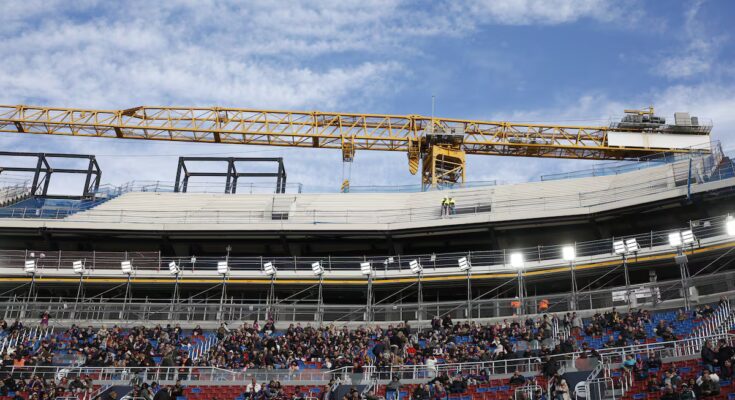Camp Nou, standing and scarf in hand, endures the emotion. The players come out of the changing room tunnel while the voice of Cor Jove de l’Orfeó Català sings the Cant del Barça. In the background, the music of the anthem is synchronized with the fireworks, which reach the iron and concrete of the third stand, practically bare, and the cranes that decorate the surroundings of the stadium. After the show, on the one hand, a tribute to all the members. Two of Barça’s oldest members, Juan Canela and Jordi Penas, who were also present 68 years ago at the inauguration of the stadium in 1957, kick off the match. FC Barcelona, 909 days later, 59 games away from its fiefdom, returns home in front of 45,157 fans. Still half renovated, the fans embrace the Camp Nou with affection, forgetting the year of delay, the broken reopening promises and some controversy. They do not forgive the absence of the cheering stands, which they claim among the chants, just like Leo Messi, who was unable to say goodbye to the Camp Nou.
Life, in addition to the tourists who have visited the museum and the Barça shop in these two and a half years, has also returned to the Les Corts neighborhood. At 12 there were already fans wandering around the shops, looking for where to eat. The restoration, which had found refuge in the people of the neighborhood and the workers this time without football, got dressed and reopened. At Rellotge, the bar where the Dracs group usually holds previews, there is nervousness and a desire to return to “life” while posters with offers and an improvised bar to quickly serve beer are set up.
Soon the bars were filled with fans. The Blaugrana, protagonists this Saturday, shared the same feeling: the emotion of returning home, but also that of looking to the future. “It will be the best stadium in the world”, many share. “It has the same essence,” others say of the works. Most of them were very moved, there were even those who confessed to having shed a tear. The words are repeated, without distinction of age, origin – from all over Catalonia, even from outside – or gender: “It is a historic day”. And everyone wants to experience it.
Two hours before the start of the match the queues had started, kilometers long despite the lazy hour. Members for decades who appealed to nostalgia, young people – heirs of the Montjuïc generation – who set foot at Camp Nou for the first time, and some families with parents who explained to their children – who asked for the Cat mascot – what they were experiencing. But also many tourists, some buying tickets at the last minute at the box office – with unpopular prices, between 199 and 589 euros – and others taking advantage of the resale that took place at the gates of Espai Barça.
When the entrances opened, the fans, surrounded by fences that separated them from the works, the concrete and the beams to be positioned, entered with cell phones in hand, recording the stadium, but also their first impression. Inside, the music and Joan Laporta were already waiting for them, overflowing with happiness in the box, taking photos, victorious. The stands were colored until the big party started at four in the afternoon, 15 minutes before the opening whistle, when Figa Flawas, urban and festive music to open the afternoon, transformed the grass into a stage. The fans endured the emotion with the anthem, even after kick-off. Football is back at Camp to stay, in principle.



